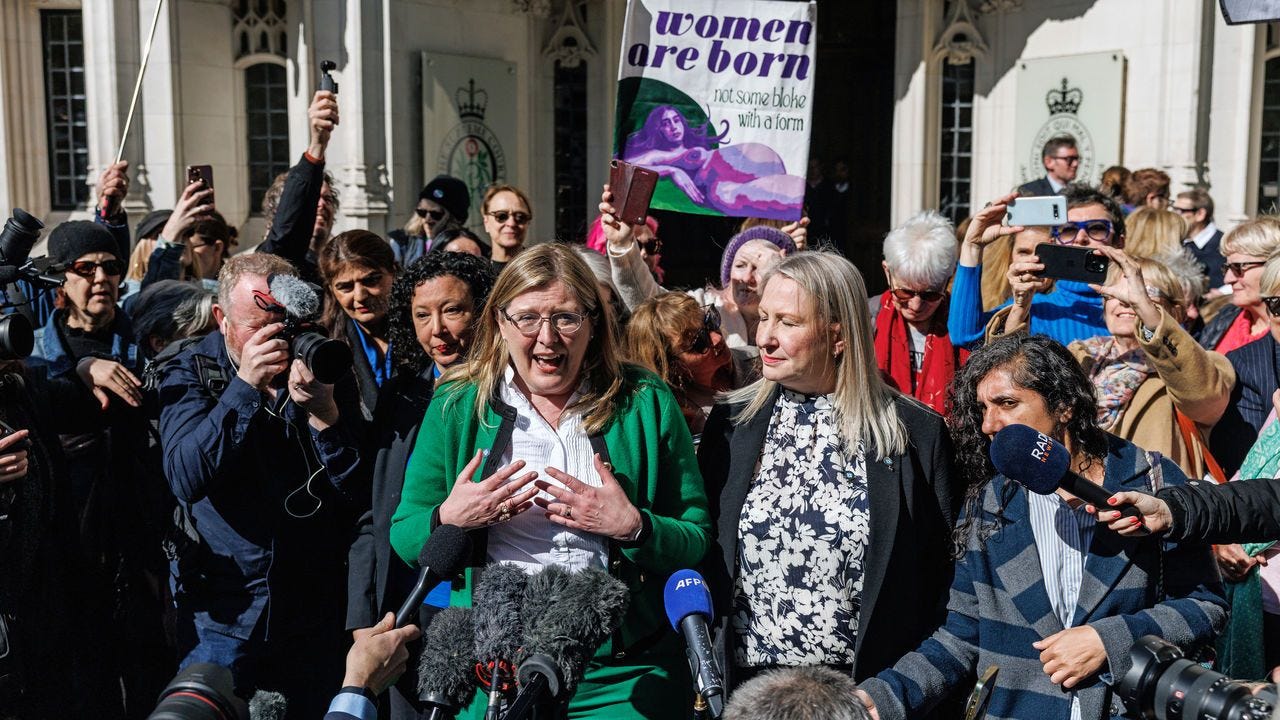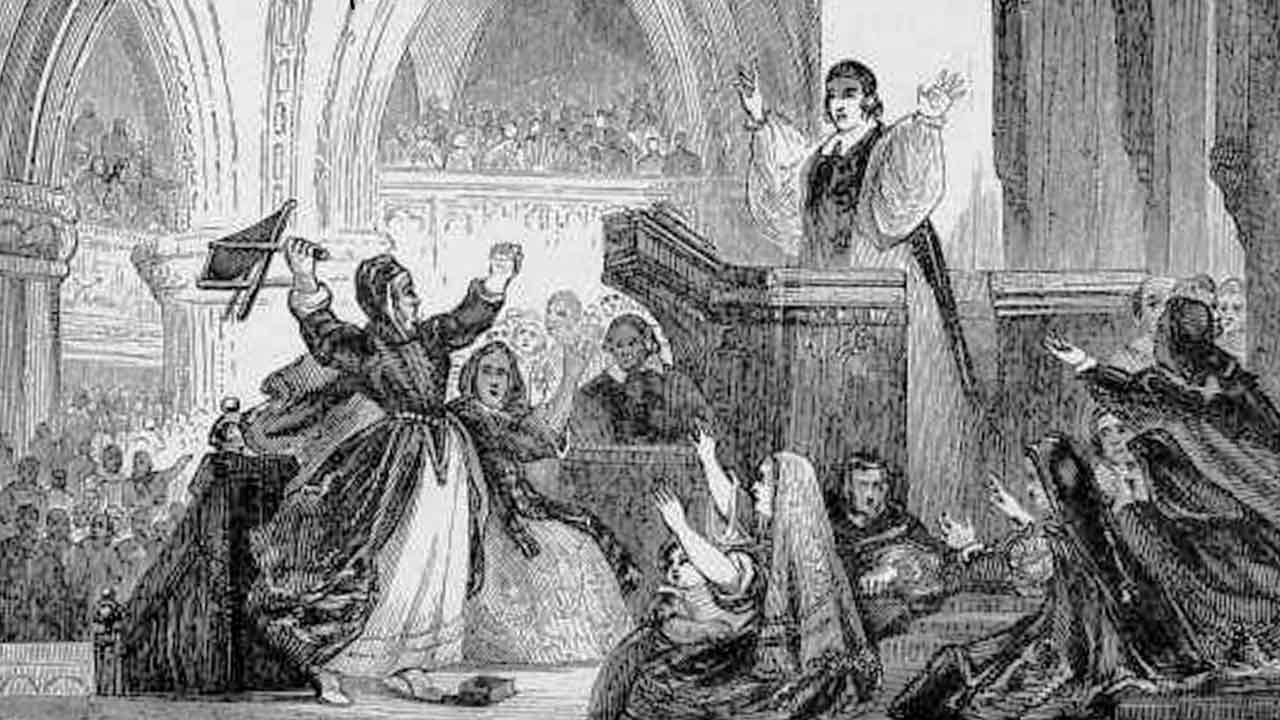Scottish Women Shall Fight The English Civil Gender Wars Until They Win
A review of 'The Women Who Wouldn't Wheesht'
Dalgety, Susan and Blackburn, Lucy Hunter, editors. The Women Who Wouldn't Wheesht: Voices from the Front-Line of Scotland’s Battle for Women’s Rights. Constable, 2024. (Amazon.com link)
According to tradition, in 1638 an Edinburgh market-woman named Janet ‘Jenny’ Geddes objected to changes in the Book of Common Prayer by throwing her stool at the minister of St. Giles’ Cathedral, setting in motion the spiral of events that led to the slaughters and tumults of the English Civil Wars. It has always been dangerous to take Scottish women for granted. No one should have understood this better than the Scottish National Party and its leader Nicola Sturgeon, a Scottish woman. Yet this is exactly what Sturgeon and the SNP did to prioritize and pass legislation written by the ‘gender identity’ lobby, leading to political disaster.
Sturgeon resigned in 2023 after stumbling through an awkward interview about a transgender-identifying rapist who had been housed in Cornton Vale, Scotland’s prison for women. Today, the SNP is a broken party and the Scottish independence project is probably over. Most recently, an organization called For Women Scotland (FWS) won an historic unanimous ruling from the supreme court of the United Kingdom upholding their challenge to an SNP policy that allowed men to ‘identify’ their way into committee positions set aside for women. The ruling has been a rude shock to transgender ‘rights’ activists across the UK who had been misled about the law for so long by their own lobby.
The odds were stacked against Scottish women. “Unbeknown to Sturgeon, and unnoticed by a civil society that no longer challenged government but instead amplified its core messages, women across Scotland, connected by online forums and social media that brought in UK connections too, were beginning to take notice of the potential clash of rights,” Susan Dalgety and Lucy Hunter Blackburn write. “If, as some politicians and commentators on the centre and left became fond of saying, Scotland was riven by a toxic ‘culture war’, it was not one of the women’s making. And not one in which those politicians showed any practical interest in trying to broker peace, despite repeated attempts by women to engage them on the issue.”
But Scottish women refused to be silent. Like Jenny Geddes, they would not wheesht. Raising hell was more their style. Despite the obstacles thrown in their way, the hatred and vitriol and attacks they received, the women of Scotland soldiered on. Calling upon the spirits of their suffragette foremothers, they took up space at Holyrood, demanded their rights, made their case, raised funds, and fought their civic battles together. They have not won every engagement, but they are winning the war, and they shall not stop fighting until they have won. Told they were on the wrong side of history, Scottish women made some history. This book tells the story.

With any anthology of primary sources, there are bound to be commonalities between accounts. For casual readers this can be a bit repetitious. For example, most of the women in this volume cite their ‘gender critical’ sisterhood as a satisfying and galvanizing experience. This is not just feminist fluff, it is social chemistry. Attempted silencing and cancel mobs and employment threats: these pressures galvanized the women in this volume, and then that solidarity preserved them through their darkest moments.
Refusing to allow any debate ultimately set the SNP up for failure. Sturgeon could not explain why Adam Graham, a convicted rapist, had been held in a women’s prison just because he had changed his name to Isla Bryson, nor why he should no longer be held there if he was indeed a woman.
Appearing at court, Bryson wore skin-tight pink hot pants so that press photographers could show the world his intact crotch-bulge. The contrast of that image with Sturgeon’s evasive non-answers was an embarrassment she could not endure. Had the first minister simply made the effort to respond to the arguments of the women she had ignored for five years, she might at least have developed a more articulate spin.
From 2018, volunteer women’s groups began to form across Scotland in reaction to what the Scottish Parliament was doing. They had to meet in secret, and even still the first meeting in Glasgow encountered “a group of protesters, many masked, young and male, gathered close to the entrance of the hall, banging pots and intimidating the women attending.” They were horrified to discover just how much policy capture had already taken place.
At the beginning, they thought they saw obvious problems that simply needed pointing out, but it soon dawned on all of them that SNP MPs were ignoring the obvious on purpose. “In this early phase, women still hoped that established women’s organizations in Scotland, not least Engender — Scotland’s ‘feminist organization’ — might play a constructive, mediating role.” Instead, those organizations ignored them.
By the time Nicola Sturgeon resigned in 2023, the SNP had passed their Gender Recognition Reform Act over the valid objections of women, only to have the government in London block the Scottish GRRA because it conflicted with the 2010 Equality Act, exactly as Scottish women had warned Holyrood would happen. MSP Ash Regan resigned the party when leadership failed to answer her questions about the GRRA.
“Time has shown this approach to have been a disaster for the party,” MSP Joanna Cherry writes. She tried to warn Justice Secretary Humza Yousef that his hate crime bill would conflict with the European Convention on Human Rights and got sacked. “The SNP was founded by intellectuals, artists, poets, and thinkers,” Cherry writes. “The lack of debate and the adherence to the Stalinist leadership line which was expected under the Sturgeon leadership would have been anathema to them.”
Cherry and Regan are not the most prominent or famous of the thirty-four contributors to the volume. Author J.K. Rowling writes that the female celebrities cheering for men in women’s spaces “have barely any experience of life without private security. Their ‘public’ bathrooms have stars on the doors and guards outside.” Echoing the less-famous, even anonymous women in this anthology, Rowling credits Sturgeon’s ‘no debate’ approach for creating the “alliances and grassroots coalitions” that opposed Sturgeon’s agenda.
Here is another common theme of the collected sources in this book as well as others I have read to date: the women in ‘gender critical’ organizing came from every point on the political spectrum in Scotland. Radical feminist analysis and leftist leanings are present in the text, though they are not extensive or annoying to read. There are however no extreme right wing views or fervid evangelical politics expressed anywhere in the book.
Why are they missing? Contrary to the feverish imaginings of genderwoo apologetics, such forces were never a serious element of ‘gender critical’ organizing, much less a source of funding. Historians will search the primary sources of the movement in vain for evidence to back up the ubiquitous claims of genderwoo proponents that nefarious American right-wing money or influence was involved.
Indeed, no one got rich on opposition to genderwoo. Rowling became the hero of TERF Island because she could not be canceled, however there are canceled writers and poets in this book, and their words ache with the loss of friends, family, community, and careers as punishment for their thoughtcrimes. The Women Who Wouldn’t Wheesht also shares this in common with primary source accounts of those who organize against genderwoo in law and policy: speaking out has meant losing a lot.
Journalist Mandy Rhodes was a friend and confidant of Sturgeon until she privately raised her concerns about the GRRA and ‘self-ID’ over a glass of wine at Bute House, the first minister’s official residence. “She looked at me, in that way she does that basically shuts down a conversation and says, ‘Young people are really distressed about it. And that’s all there is to it. We need to do something about it.’” Rhodes soon found herself frozen out, her interview access denied, while Sturgeon formed a new government coalition with the Scottish Greens, who demanded the GRRA be passed as part of the bargain. Having no majority — for the SNP had no organizing purpose after the defeat of the independence referendum in 2014 — Sturgeon tightened her grip on her remaining MSPs to keep the bargain, and her majority.
Reading Dalgety’s profile of Rhodes, I was struck by the resonant experience of Kara Dansky, an American radical feminist. In my recent interview with Dansky to talk about her books, she mentioned a friend from her past in Democratic politics who “talks with Hillary Clinton on the daily.”
And I've known this woman for a very long time. And she knows what I think about this. And she hasn't unfriended me on Facebook, miraculously. So I texted her several months before the election because I was like, if Hillary can say something, maybe maybe we can turn this stupid thing around. And I texted her and she said, “Kara, I'm happy to talk, but I'm not going to talk about trans.” And I wrote back and I was like, “This is such a serious issue for the Democratic Party. Can we please talk about this?” And she said, “Absolutely not. Under no circumstances am I talking to you about trans.” And that was that. So I just had to let it go.
As political weakness led Nicola Sturgeon and the SNP to make their disastrous commitment to ‘self-ID’ and then dismiss concerns in their headlong rush to pass the GRRA, so the Democratic Party has doubled-down on genderwoo in policy and law in the American states that it controls, post-November, out of political weakness. Political historians will be interested to note this commonality across the western world: as liberal-left coalitions frayed over the last decade, and their power slipped away, the totalitarian demands of genderwoo offered party discipline.
Rhodes reveals that ‘gender identity’ and legalized self-identification as the opposite sex were supposed to be very important to a progressive youth generation, justifying everything that followed. Politicians were sold this bill of goods on both sides of the Atlantic. The supposed inevitability of a voting majority that will eventually materialize when elder politicians recite the right mantras became programmatic in ‘progressive’ politics during the first decade of the 21st century. The ‘trans kids’ are salvific, angelic figures, even child gods to a new cult that has colonized our civic religions by promising this imminent, eternal capture of the youth vote.
Chapters in this book are short, so it is a fast read, even at 349 pages. Dalgety and Blackburn have arranged their sources in more or less chronological order using thematic sections and filled the gaps with journalistic prose. The result is an entertaining chronicle. Scottish women were up against a powerful lobby that captured public policies in advance of public notice. They fought back with humor and creativity. Their battles, losses, and ultimate victories are still changing the politics of Scotland.
The volume stops in 2023, and was published in 2024, so it does not chronicle the litigation path of the recent supreme court decision. That year is perhaps a convenient cutoff anyway, since the social media history of ‘gender critical’ organizing changed at the end of 2022 with Elon Musk’s purchase of Twitter. It is to be hoped that the editors of The Women Who Wouldn’t Wheesht will not wheesht now, but deliver to us a second volume that tells Part II of this remarkable political history which is still unfolding.
Now available in the United States. (Amazon link)
The Democratic Party Civil War Makes It Even Harder To Give Up Genderwoo
Democrats are at war over the future of the party, making them even more resistant to hearing concerns about their sacred progressive cows, such as ‘gender identity’ ideology. From Washington, DC to Maine to Colorado to California, Democrats have doubled-down on imposing the genderwoo program from the top, wherever they have power. This virtue-signalling is oppositional to Donald Trump, for Democrats lack a consensus leader and the one thing they can agree on is opposing him.








